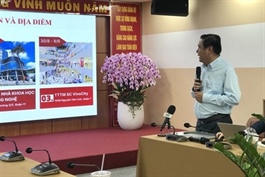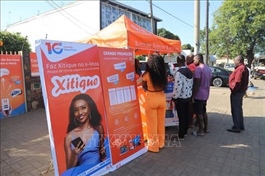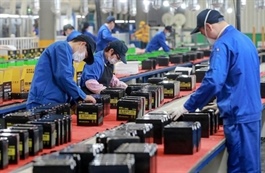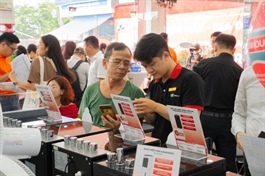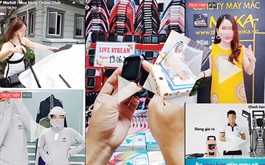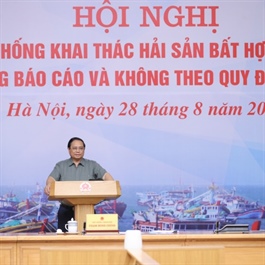Digital elevator media becomes important, popular advertising channel: forum
Digital elevator media becomes important, popular advertising channel: forum
The development of digital elevator media in Việt Nam will be driven by rising demand and technological capabilities, along with changes in consumer advertising habits and preferences, experts said.
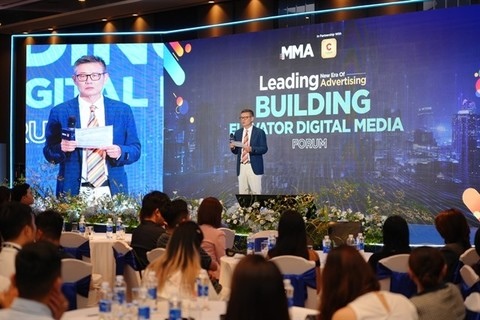
Guo Zhi Feng, chairman and CEO of Chicilon Media delivers a speech at the “Leading a New Era of Advertising: Building Elevator Digital Media” forum in HCM City on Thursday. — Photo courtesy of the organiser |
At a forum entitled “Leading a New Era of Advertising: Building Elevator Digital Media” organised by MMA Global, in collaboration with Chicilon Media in HCM City on Thursday, 400 marketers and executives discussed and shared the latest trends in the digital out-of-home (DOOH) advertising industry as well as successful strategies in developing elevator advertisements.
DOOH ad spend is expected to grow by 34 per cent across Asia by 2027. And, Việt Nam’s DOOH spending is expected to rapidly grow to over US$46.8 million by 2029. An average of about 39-52 ads are currently seen by each building residents or worker per day.
According to research, elevator advertising offers superior effectiveness compared to other formats such as television, internet, and traditional outdoor billboards.
For example, with high broadcast frequency, elevator advertising ensures that target audiences will see the ads when they enter a confined space like an elevator, thus increasing recall and recognition.
This type of advertising often appears in upscale residential areas and office buildings -familiar environments for high-income target customers who are willing to spend. This is the secret to maximising the strengths of digital elevator advertising, the research found.
In addition, digital elevator advertising often combines audiovisual elements on high-quality image and sound systems. Even though the ads have a short duration, they still achieve high engagement, always attract attention, and leave a lasting impression on viewers.
Digital elevator advertising is also an attractive option for many businesses due to its affordable cost but high effectiveness in reaching the target audience.
Compared to other formats, digital elevator advertising has a higher viewer engagement, reducing the impact of distractions found with TV, internet, or billboards. Therefore, Digital Elevator Advertising is optimal for campaigns that aim to enhance brand recognition and promote new products, especially for target customer groups that frequently shop in large urban areas.
“The importance of digital out-of-home advertising (DOOH) lies not only in its broad and diverse reach but also in its ability to create unique and interactive customer experiences. Elevator media, in particular, stands out with its confined environment, making messages easily accessible and memorable,” said Phan Bích Tâm, country director of MMA Global Vietnam, Cambodia, and Myanmar.
This close and frequent exposure yields high effectiveness, attracting attention and creating strong interaction with viewers. Elevator media is a potential advertising channel that effectively and creatively enhances brand recognition, she said.
Experts told the forum that elevator digital ads impact the right consumer. There are many apps on online channels which may lead target consumers to be distracted, while elevator digital media fully reaches the target consumer pool.
“There is no other app on elevator digital screens except the ad so content is focused with high frequency, which increases the effectiveness of ads,” said Nghĩa Phan, co-sales director for the Southern region of Chicilon Media.
“People can’t click skip ad in elevator digital media or surf to other content,” he added.
Rachana Lokhande, founder of Glocal Bridge, predicted that “drawing from worldwide experience, it can be anticipated that digital elevator media in Việt Nam will experience significant growth in the coming years.”
According to Lokhade, with increasing urbanisation and the development of high-rise buildings in Việt Nam, the demand for digital elevator media is expected to rise, particularly in major cities and shopping centres.
“The technology behind digital elevator media will continue to advance, featuring higher-quality screens and interactive elements, while advertising content will become more diverse and engaging to capture viewers' attention,” she said.
Furthermore, consumer attention to elevator advertisements is likely to increase due to the close and undistracted environment of elevators, thereby improving the effectiveness of advertising campaigns.
Integration with new technologies such as data analytics and artificial intelligence may optimise advertising broadcasts, personalise content, and enhance the viewer experience.
“As Vietnamese consumers become more familiar with digital advertising formats, digital elevator media will become an increasingly important and popular advertising channel,” she added.
At the forum, representatives from companies shared experiences in how to have a successful elevator advertisement campaign.
The forum also expanded collaboration opportunities between brands and agencies.




